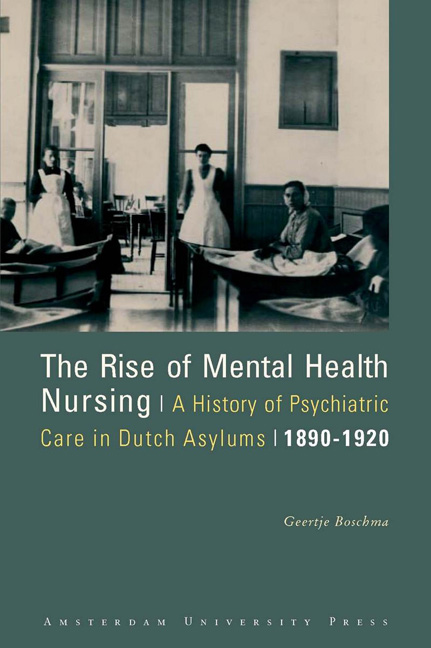Book contents
- Frontmatter
- Contents
- Acknowledgments
- Introduction
- Chapter I Asylum Reform Ideals: Personnel Matters
- Chapter II The Ideal of a Mental Hospital
- Chapter III Female Compassion: Mental Nurse Training Gendered Female
- Chapter IV The Burdensome Task of Nurses
- Chapter V Negotiating Class and Culture
- Chapter VI The Marginalization of Male Nurses
- Chapter VII Controversy and Conflict over the Social Position of Nurses
- Conclusion: The Politics of Mental Health Nursing
- Appendix
- Notes
- List of Illustrations
- List of Abbreviations
- List of Archives
- Bibliography
- Index
Conclusion: The Politics of Mental Health Nursing
Published online by Cambridge University Press: 28 January 2021
- Frontmatter
- Contents
- Acknowledgments
- Introduction
- Chapter I Asylum Reform Ideals: Personnel Matters
- Chapter II The Ideal of a Mental Hospital
- Chapter III Female Compassion: Mental Nurse Training Gendered Female
- Chapter IV The Burdensome Task of Nurses
- Chapter V Negotiating Class and Culture
- Chapter VI The Marginalization of Male Nurses
- Chapter VII Controversy and Conflict over the Social Position of Nurses
- Conclusion: The Politics of Mental Health Nursing
- Appendix
- Notes
- List of Illustrations
- List of Abbreviations
- List of Archives
- Bibliography
- Index
Summary
The Disappointment of Somatic Explanations in Turn-of-the- Century Psychiatry
As was also true of hospital nursing, mental nursing emerged within a broader context of social and medical changes in the late nineteenth century. The mental nurse training system that psychiatrists established within the asylums reflected the ideal of raising the level of asylum personnel and oriented asylum care towards the achievements in hospital medicine. The promise of science, the improving image of the hospital, and the apparent success of organic explanations of diseases were so forceful that such explanations also gained strong social support in psychiatry. Psychiatrists, socialized in the cultural and scientific values of the time, were strongly attracted to the image of the general hospital and sought to transform the asylum into a mental hospital.
Placing the care of the mentally ill on a new scientific biomedical footing was a powerful motivation of liberal-oriented psychiatrists. At the Meerenberg asylum, which was rooted in a liberal tradition, the shift to this new somatic orientation was favored both by the physician staff and the asylum board, although the transition did create tensions. Most asylums, however, were more hesitant in making the transition. Franeker in particular feared the costs the new medical treatment implied, and the conservative Protestant and Roman Catholic institutions also had strong objections to it. Within these institutions the materialistic scientific notion of mental care threatened conservative religious beliefs and the transition to a medical model was less easily made. The transition sometimes provoked strong reactions – for example, from the VCV, which attempted to develop its own Christian psychiatry and philosophy of asylum care. Essentially the new science-based practice profoundly changed the organizational structure of the institutions and transformed longstanding traditions of institutional care based on a lay, middle-class household model.
The shift to a professionally based, hospital-oriented institution was made with the expectation that scientific principles and skilled, somatically oriented care would make the asylum a more humane and effectual place, and yet its success was limited. The implementation of more competent nursing care definitely had a favorable impact on the health of the many bedridden patients.
- Type
- Chapter
- Information
- The Rise of Mental Health NursingA History of Psychiatric Care in Dutch Asylums, 1890–1920, pp. 225 - 234Publisher: Amsterdam University PressPrint publication year: 2003



